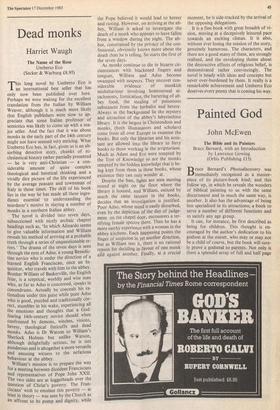Dead monks
Harriet Waugh
The Name of the Rose Umberto Eco (Seeker & Warburg £8.95)
This long novel by Umberto Eco is an international best seller that has only now been published over here.
Perhaps we were waiting for the excellent translation from the Italian by William Weaver, although it is much more likely that English publishers were slow to ap- preciate that some Italian professor of semiotics was likely to come up with a ma- jor seller. And the fact that it was about monks in the early part of the 14th century might not have seemed very enticing. What Umberto Eco has, in fact, given us is an ab- sorbing detective story, chunks of ec- clesiastical history rather partially presented — he is very anti-Christian — a con- siderable amount of quite complex theological and heretical thinking and a vividly dire picture of the life experienced by the average peasant and townsman of Italy in those times. The skill of his book lies in the way he has made all these ingre- dients essential to understanding the murderer's motive in slaying a number of monks in a northern Italian abbey.
The novel is divided into seven days, subsectioned with nicely archaic chapter headings such as, 'In which Alinardo seems to give valuable information and William reveals his method of arriving at a probable truth through a series of unquestionable er- rors.' The drama of the seven days is seen through the eyes of Adso, a young Benedic- tine novice who is under the direction of a learned English Franciscan, once an In- quisitor, who travels with him to the abbey. Brother William of Baskerville, the English friar, is a sceptical, worldly and wise man who, as far as Adso is concerned, speaks in conundrums. Actually he conceals his ra- tionalism under this guise while poor Adso who is good, puzzled and traditionally cor- rect, stumbles in his wake, experiencing all the emotions and thoughts that a God- fearing 14th-century novice should when confronted by demons, witches, visions, heresy, theological fisticuffs and dead monks. Adso is Dr Watson to William's Sherlock Holmes but unlike Watson, although delightfully serious, he is not Ponderous and is altogether a more versatile and amusing witness to the nefarious behaviour at the abbey.
William's mission is to prepare the way for a meeting between dissident Franciscans and representatives of Pope John XXII. The two sides are at loggerheads over the question of Christ's poverty. The Fran- ciscans' wish to emulate this poverty — at least in theory — was seen by the Church as an affront to its pomp and dignity, while
the Pope believed it would lead to heresy and rioting. However, on arriving at the ab- bey, William is asked to investigate the death of a monk who appears to have fallen from a window during the night. The ab- bot, constrained by the privacy of the con- fessional, obviously knows more about the death than he is telling. So starts the first of the seven days.
As monks continue to die in bizarre cir- cumstances with blackened fingers and tongues, William and Adso become swamped with suspects. They uncover con- siderable evidence of monkish misbehaviour involving homosexual at- tachments, fornication, the bartering of ab- bey food, the stealing of poisonous substances from the herbalist and heresy.
Always in the background lie the mystery and attraction of the abbey's labyrinthine library. It is the largest in Christendom and monks, (both illuminators and scholars) come from all over Europe to examine the books. But only the librarian and his assis-
tant are allowed into the library to ferry books to those working in the scriptorium.
Much as Adam and Eve were tempted by the Tree of Knowledge so are the monks tempted by the hidden knowledge that is be- ing kept from them in these books, whose existence they can only wonder at.
Despite the ban, lights are seen moving round at night on the floor where the library is housed, and William, enticed by much the same interest in the books, decides that an investigation is justified. Poor Adso, whose mind is easily disturbed, even by the depiction of the day of judge- ment on the chapel door, encounters a ter- rifying female spectre there. Then he has a more earthy experience with a woman in the abbey kitchens. Each happening points the finger of suspicion in yet another direction, but as William sees it, there is no rational reason for deciding in favour of one monk and against another. Finally, at a crucial moment, he is side-tracked by the arrival of the opposing delegations.
It is a fine book with great breadth of vi- sion, moving at a deceptively leisured pace towards an exciting climax. It is also, without ever losing the tension of the story, genuinely humorous. The characters, and there are a good many of them, are strongly realised, and the enveloping theme about the destructive effects of religious belief, is demonstrated rather convincingly. The novel is heady with ideas and concepts but never over-burdened by them. It really is a remarkable achievement and Umberto Eco deserves every penny that is coming his way.






































































 Previous page
Previous page